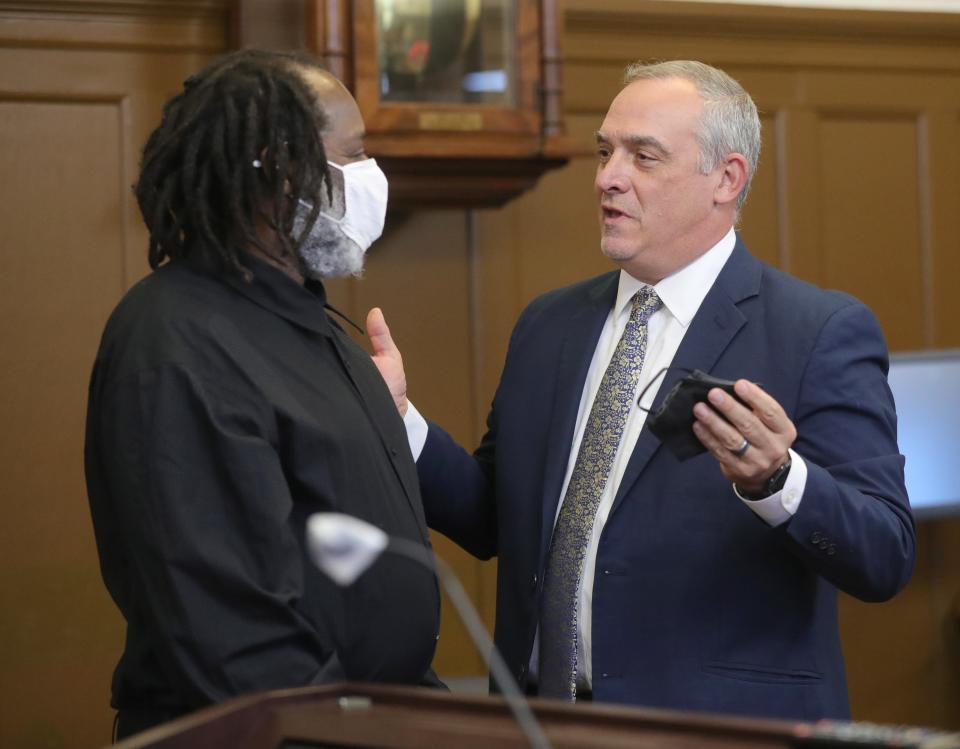UA prof: Defendants representing themselves have 'fool for a client — most of the time'
Those trained in the legal profession often point to a famous Abraham Lincoln quote when discussing pro se defendants: “The man who represents himself has a fool for a client.”
“There’s a lot to be said about that,” said Assistant Summit County Prosecutor Brian LoPrinzi, who heads the criminal division. “Not that they aren’t capable or smart enough, but they haven’t had the training. If you don’t know the rules, how do you do it?”
LoPrinzi added that a doctor wouldn’t perform surgery on himself.
“When your freedom is on the line, you want a professional handling it,” he said.

Defendants who are charged with felonies, though, have a right to legal representation – and can choose to waive this right. Judges, prosecutors and defense attorneys have to respect this choice, even it might make their jobs more difficult.
History of the right to an attorney
Gideon v. Wainwright, a 1963 U.S. Supreme Court decision, required states to provide legal representation to people charged with felonies who can’t afford their own attorneys.
“There was a long period where that right wasn’t provided to everyone,” said Michael Gentithes, a University of Akron law professor. “The Supreme Court recognized that’s necessary to ensure a competent and fair trial for all parties.”
Gentithes, who recently was named associate dean of academic affairs, tells his students that even an attorney representing himself in a criminal case is a bad idea.
“You need a separation between the facts and the law,” he said.
Before joining UA, Gentithes was an assistant appellate defender for Illinois, handling appeals for indigent defendants. He said this was more challenging for cases involving defendants who represented themselves at the trial level because the trial record often wasn’t developed as clearly, making it more difficult to raise issues on appeal.
Gentithes said people who choose to represent themselves might have the perception that everyone in the courtroom is “part of the same machine.” In some ways, he said, this is true because everyone in the courtroom – including defense attorneys appointed to represent indigent defendants – is being paid with taxpayer dollars. However, each party has a role to play in the process, he said.
Defendants representing themselves can slow down the process of concluding a case and the outcomes are most often negative, Gentithes said.
“If you represent yourself, you have a fool for a client – most of the time,” he said.
How the pro se process works
When defendants want to represent themselves in Summit County, the judge holds a hearing to determine if they are competent to be pro se and want to waive their right to an attorney. If defendants are permitted to be pro se, the judge normally appoints a standby attorney to assist them through the process.

Amy Corrigall Jones, the administrate judge in Summit County Common Pleas Court, said defendants aren’t permitted to hybrid representation in which they are pro se and still have an attorney speaking for them or filing documents on their behalf.
Jones said cases with pro se defendants are challenging because of their lack of knowledge of the law, legal procedures and courtroom decorum.
“It’s the balance of holding them to the standard of a lawyer knowing the individual does not have formal legal training,” she said.
LoPrinzi said pro se defendants often don’t understand the rules of evidence and prosecutors must object during trials, which can make it look like they’re bullying the defendant. He said jurors might think the defendant couldn’t afford an attorney, which isn’t the case.
“It’s a difficult thing to deal with,” LoPrinzi said. “It takes the focus off the facts of the case and puts it on the defendant representing himself. That is not ideal for a just result.”
LoPrinzi said defendants representing themselves in Summit County have prevailed on cases involving lower-level felonies but usually don’t succeed in cases involving more serious crimes.
Some defendants decide to stick with attorneys
Some Summit County defendants have considered the pro se route but then changed their minds.
'At least it's life': Stanley Ford gets 9 life sentences

Stanley Ford, who was sentenced to life in prison last year for the arson murders of nine of his neighbors, considered representing himself at one point but decided to continue having attorneys Scott Rilley and Joe Gorman represent him. Ford faced the death penalty
“When Mr. Ford saw the complexity of the procedures involved, he realized it was better to have someone trained in the procedures to handle his case,” Rilley said.
Stephanie Warsmith can be reached at swarsmith@thebeaconjournal.com, 330-996-3705 and on Twitter: @swarsmithabj.
This article originally appeared on Akron Beacon Journal: Local legal experts advise against defendants representing themselves

